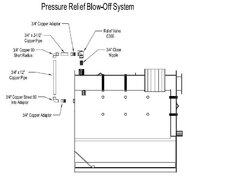I am installing a Kerr TW2000 Highlander indoor wood boiler. It comes with all the parts required to install what Kerr calls a Blow-down extinguishing system. Basically, the pressure relief valve on the top of the boiler is piped directly into the firebox (instead of into a bucket or right to the floor on most boilers). I guess what it is supposed to do, is if the dump zone doesn't take care of the extra heat and pressure, and the pressure relief valve blows, it will put your fire out.
BUUTTTT, this will dump a ton of water right into fire box causing huge blooms of steam not too mention possibly cracking or warping the firebox. I was always told never to through water directly into a raging wood stove/boiler fire, but this goes against that rule.
What do you guys think? I am thinking about plugging the hole at the front of the boiler and simply running the pressure relief pipe into a bucket or something.
BUUTTTT, this will dump a ton of water right into fire box causing huge blooms of steam not too mention possibly cracking or warping the firebox. I was always told never to through water directly into a raging wood stove/boiler fire, but this goes against that rule.
What do you guys think? I am thinking about plugging the hole at the front of the boiler and simply running the pressure relief pipe into a bucket or something.


